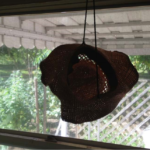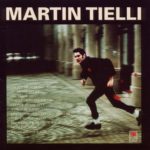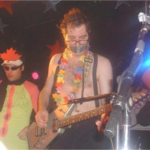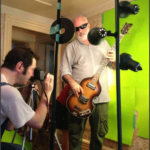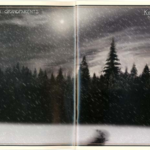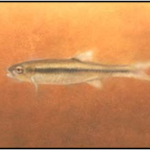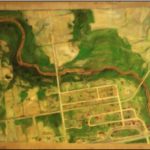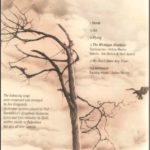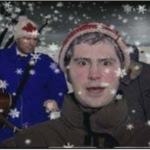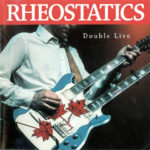The Martin Tielli Interview 23Aug2013 – Part 2 of 4
D: So the title of the new album is A Quiet Evening At Home. I was saying it was the least ironic thing about the album. From a Nick Buzz album I thought that it would be the antithesis of that.
M: Good I’m glad to hear you say that. Like I said earlier, that’s the way it was turning out and a lot of the rehearsals were us in a living room. But yeah it was a joke -like this is the worst, most mundane album title. It actually is like a quiet evening at home.
D: Was that one of the impromptu songs that was written?
M: That was one of the 10 hours of improvisations; almost static; towards the end. It’s a breather- thinking about the pace of vinyl albums.
D: It is interesting though because you went from an improv. song, which plays out on the album, like a long lead in to Uncle Bumbo’s Christmas.
M: It flows into it. That’s where you flip the record. That’s where you flip the record but if you are in the optimum frame of mind that we intended- that will be a sweet treat.
D: It sounds like a big long extended intro that song which is a song from there into House With The Laughing Windows, which was the same version that was on Danny G., is it not?
M: A few improvements and remastering. It belonged on this album. It belonged here.
D: So you’ve got those three songs, which are almost like present, past and recent past of Nick Buzz. The House With The Laughing Windows being from the Nick Buzz component of the Danny G album. Why did you end up putting that song on both albums?
M: Well it probably didn’t belong on the Danny G thing but mood-wise and feeling-wise it fit. I love live recordings. I’d do all live new albums of songs if I could.
D: You do that a lot on both albums. You have River, which was a live version…
M: You can’t do it better. It can’t be done better. When something like that happens it is worth it because it doesn’t happen that often. Something that actually plays on stage perfectly in front of an audience with decent sound is better than something done well in a studio with “perfect” sound. Live music is always better.
D: That’s the second song you used twice on albums, the other one being Waterstriders which you had on Danny G and Operation Infinite Joy.
M: But very different versions. The second version I put out was actually meant for Poppy Salesman and was totally acoustic. The one from Operation Infinite Joy was in the studio live with my band. Then I went back to before for Poppy Salesman that was a version Mike Phillip Wojewoda had recorded that I brought back out for Danny G.
D: OH ok so the one on Danny G was actually recorded before OIJ.
M: Yeah. The way Mike recorded the guitars so beautifully on Poppy Salesman. So fat and heavy. He had this really nice wiener shaped mic. from Germany.
D: So what is the essence of Waterstriders because it has a key part in Danny G?
M: It was written for the Danny Gross records. It kind of squeaked out a little early. I didn’t think I was ever going to get to do that record at that time.
D: OK so you just did a video for The Genitalia Will Lay Eggs…What’s the song called?
M: The Penii Will Lay Eggs
D: The Hens Lay Every Day – That song leads off the album and is probably the least representative of what the album is like.
M: Totally
D: What is that song about?
M: I’m trying to figure that out.
D: That’s a newer song I take it?
M: It is, really new. It came out an improvisational jam when I actually wasn’t there. Lyrically, It’s about the noise from the outer world and a hatred of nature. Resenting the laws of “nature”.
D: Was there other stuff that the guys in the band did that was similar to that in the jamming of songs for the album?
M: With that song the basic track was a loop of sorts. It got so dense. There was no planning or quantizing or anything when we are in the studio. We don’t know how anything is done when it gets to tape so there is no way of replicating it again. They were just letting a few machines run and controlling it as they ran waited for the sweet spot. We chopped out the sweet spot or 2 or 3 and I composed something over it. There are some remnants of it in the body of the song but in the basic groove. Then I recorded percussion over it to pump it up little out here at my cabin D: Yeah there is a drum machine on the back track.
M: It was actually percussion I was recording a long time ago for the Rheos when I was trying to convince them to go into dancier Music.
D: That’s kind of reminiscent of Record Body Count 2.0. The bonus track on 2067 which was kind of a nod to the future where we would be if… That song to me is like the bookend of your Rheostatics career.
M: (laughing) Tim did that by himself and showed it to us and we said that is so… good. The running joke at that time was that we were going to do a tribute to Stompin’ Tom Connors called Stompin’ Tron Connors but it was all Techno Stompin’ Tom.
D: That sounds like something you would do as an opening band for yourself.
M: It was a joke that was being passed around…Stompin’ Tron Connors, part of Tim Vebron and Rheostar. That we never did it is too bad.
D: So Tim Vebron and Rheostar, who came up with those ideas? Crazy opening band opening up in … I don’t know what it was, with the wigs… there was an element to it that was almost reminiscent of The Look People opening up for themselves as GUELPH the heavy metal band. That to me is kind of an extension of the idea.
M: (laughing) oh yeah except they did it really well. GUELPH!
D: So who came up with the idea?
M: Oh god I don’t know. It was probably something just rolling around and one day Dave would say “We’re doing it on Tuesday, wear whatever”. I lost that guitar. I had a Roland guitar synth, lost it in a move.
D: So back to the Genitalia Will Lay Eggs…that song is actually in some ways kind of a bridge if you looked at Nick Buzz as far as their progression. It has that quirky Circo element to it leading into an album that is really not so much like that album. Elements of it are in this album. It is like a bridge form what it was to what it is. Am I off on that? It probably wasn’t intentional.
M: Not intentional but I can get into that. Maybe that’s why we let it happen.
D: It is definitely the most off kilter song on the album.
M: But you can dance to it. Breeders will dance on it.
D: I didn’t but I guess you could. We can dance after if you want.
M: It’s too short to dance to…I don’t know I don’t think about dancing….
D: So you did the video for The Hens Lay Every Day. Is this the first video you’ve done?
M: The first I’ve totally done everything. Shot it, edited it, and animated it. I had to understand cameras…the whole thing top to bottom by myself.
D: Did you enjoy it?
M: I learned a lot. Did I enjoy it? No…Yes….Kinda. I thought I had to do it because seeing these programs there and knowing I could do something fun with them and interesting and having been involved in many, many, many videos co-directing and conceptualizing and watching them being done by some amazing people over the years. I thought: I can’t afford to get people to do it anymore, so I might as well do it. But I avoided it for a long time because I do enough already. I paint, do music, do I really want to…3D modeling….
D: 3D Modeling?
M: I’m obsessed with architecture, rendering in 3 dimensions on the computer…studying buildings.
D: Like AutoCAD?
M: The easy version -SketchUp for Google Earth. I’m doing a bunch of buildings for my home town of Caprino and a bunch of buildings up in Grey County, Priceville. I do them really accurately. I LOVE it. Nobody likes it except me. My mother says “I don’t understand why you want to do that, it’s not creative”. I say to my Mama that it’s just about the buildings and the place… just because I love them. That’s what I’ve always done.
D: So you are involved in a whole lot of creative art areas. You do music, you write, you do video, you do painting, you do computer 3d rendering. Do you see yourself primarily in any one? Do you see yourself as a painter first?
M: I think the whole time I was being a musician I thought I was a painter on hold. I was keeping it, I was doing it, but I wasn’t… I wanted to see how music played out… and it played out. We rode out on the end of it as it used to be commercially and societally. Now that that is sort of resolved I feel like a painter and that’s the thing I think about all the time. That’s the thing I’m most serious about now. That’s where I put my effort.
D: So the essence of where you come from as an artist is in…
M: Illustration
D: You’ve done that longer than you’ve been a musician
M: WAY longer. That’s what I’ve always loved.
D: Back to working at The ROM?
M: I was a scientific illustrator at the ROM.
D: And that element is infused…
M: I tried to use it…to make our album covers more interesting than other people’s album covers. And use it all the time because I can do it.
D: It’s an important creative tie as well. Most people know you as a musician but there is a strong visual element to all of the albums that you have released as Rheostatics and as a Solo musician that underlies the creative process of what I think you are doing. Or maybe it is an expression of what you want to convey…I’m not sure what my question is…
M: Remember it’s not that different. The pursuits aren’t that different. We all think visually. They’re easily tied into each other.
D: Do you enjoy painting more than music?
M: As a way of life, yeah.
D: If you could make a living off of painting is that the way you would go?
M: That’s the way I’ve gone. It’s a better living these days.
D: Do you get more out of it?
M: (pause) Different things. In terms of, it really is so simple as, when you do music you only are actually doing it 3% of the time. When you are a painter you do it 90% of the time. It’s that obvious. So what you love about what you do is most of it, whereas with music I actually really, really hate the other parts of music. Certain social aspects I don’t mind, but they don’t necessarily make you a better musician. They are just kind of fun cause you get to hang out with people. You don’t with art unless…There are so many distractions in music it is ridiculous…for me. There is so little to actually do with music when you are doing it, even in such obvious ways as traveling. You spend 10 hours in a car and 5 hours at the place you are going to play. But after your 35th time across Canada it’s not fun and when it becomes a bit of a machine, and there is not even any time left to see where you are, because hotel rooms cost money and you just have to travel. You can’t even know you are in Regina or whatever. The first bunch of tours were actually a fantastic learning experience of other people and other places and cities back when other cities looked somewhat different from each other. They weren’t surrounded by Staples and Tim Horton’s.
D: This is making me think about Jackson Brown’s Running On Empty album about life on the road.
M: I was watching a BBC documentary last night about West Coast Music; I hate everything West Coast by the way. Everything west of the Rockies should be severed and sunk (Laughing). That’s where stupidity comes from. They had David Geffen talking about what a beautiful man Jackson Brown was…
D: (Laughing) I guess I totally brought up the wrong point.
M: I just hate Jackson Brown’s hair. I want to set his hair on fire. I hate guys with that kind of hair. That kind of hair has just got to be burned… Bouncy straight lustrous hair. The thing is that his music sounds like that. I hear his healthy hair. The Rheostatics used to have a drummer with Jackson Brown hair.
D: Well I pretty much hate anybody WITH hair.
M: YES
We talk for a few minutes about Running on Empty before getting back to the questions about The Ghost of Danny G….
D: “The Ghost of Danny Gross Parts 1 and 2 – the first record album I wanted to make and probably the last I will make. Singles from here on out. Ending where you started? Always where I wanted to be.” Do you still feel like that?
M: Sure
D: OK so now you have a new album (everyone laughing).
M: That’s different though. It’s definitely how I was feeling when I wrote that.
D: I was listening today to the song Shack in the Cornfields and I thought, does this relate in some way to what Danny G was? Was it a precursor to what that album ended up being.
M: A little bit yeah.
D: Can you tell me a bit about what Danny G is and why that album was something that you had been thinking about for so long. Because it’s kind of a ghost story about … well why don’t you tell me about what it is to you, and why you’ve wanted to write about it for so long?
M: When I was a kid from about the age of 9 to 13 or 14 I used to collect ghost stories. I was obsessed with ghosts and the paranormal and all that fantastic stuff. I interviewed all my relatives, great aunts, my grandmother in Italy and got amazing testimonies from them. I had a big full binder full of stories, which I have unfortunately lost. I took it to show people at some point long after the fact, probably when I was about 18 and I left it somewhere. There is that in play, but there’s also the fact that my favorite place in the world was my grandparent’s up in Grey County, this town called Priceville. I’ve basically been documenting that place since I was a kid. I know that place; every corner of the forest; every square foot of it; all the animals; everything. I lived for that place until I started playing music essentially. I’ve got sketch books full of…well I was a wildlife artist. I am a wildlife artist.
D: And apparently some fish.
M: (laughing) Lots of fish. Loved, loved – I’m a fishaholic
D: (laughing) Nobody would know that you like fish.
M: Haha no…you know if you put on goggles and go in the Humber River there’s a whole world under there full of beautiful fish. All kinds of little fish that look boring from above, you think oh just minnows, but they’re actually all different kinds, baby pike, and baby trout, with beautiful colours. Amazing. But yeah I mapped this place inside and out and I just LOVE it; the beautiful places that nobody sees. You live in them and you think “I know nobody’s ever been in this place because it’s really hard to get to and it’s really boring…but it’s so beautiful and I got to SHOW people this”.
D: Is that the map that you painted in the Danny G album?
M: That map is sort of a cartoon version of folders of maps that I’ve made of that place. I tried to distill it so that it could read small. Then I started constructing this story. That’s where the notions of ghosts…because there are ghosts…you feel the past…you know that people have lived there and this town has a surprisingly strange history as most towns do. Every time I do a painting I look at this material, all this studying that I did. But it also is going back to the feeling of discovery and not being distracted.
D: So there is an element to it that is kind of like what I was saying about Sea Monkeys or It, drawing on your childhood.
M: It is more of a direct reflection on that; a little bit sentimental. The kind of sentimental that only someone coming out of that stage of their life can be. It’s like that part of me is dead. I’ll never feel that directly about anything again cause life is now complicated.
D: The reflection of the innocence of childhood. That’s how I think of those songs. Maybe that album and something like Sea Monkeys or It, those referential childhood reflections are an element of being able to in your adult life pull out things that normally get lost as you get older, and you are unable to relate to or remember anymore. So is Danny G you relating to your childhood?
M: Well I don’t feel like I’ve lost it. When I’m in those songs I’m in that same place. It’s about mystery and eternal things. The things that you’re going “Yeah I know all of this stuff is going on but what the is THAT? And what was THAT? And I’m scared”.
D: You did the Martin Tielli 2003…series…what’s it called again?
M: the Subscription Debacle.
D: In the context of that album, and how important the Danny G albums are to you, do you feel constricted by the promises associated with the limitations of it in relation to being able to release it as an actual double album…Do you feel like you wish you could just put it out right now as it is? Because I know you are talking about putting it out as a distillation of it. Do you feel that is a compromise now because of the circumstance?
M: No I don’t. I almost feel like a lot of that was experimentation and now I’ve got to whittle it down. I almost feel….
D: It will be more reflective of what you have to say?
M: Yeah. I wish I could expand on the art and shrink the music. Do you know what I mean?
D: Yeah but do you want to add another 12 years to the process?
M: (laughing) No.
D: Because I’m pretty sure the artwork was what kept it back for so long. And I’m not making fun of you. Well I’m sort of making fun of you.
M: It was a lot of things, sort of like doing that record album. I had to learn how to do everything. I learned Cubase inside and out. I had to learn microphones; I had to learn everything.
D: Because you were doing most of those albums on your own.
M: I did everything by myself, almost. At the end I gave it to Chris Stringer to mix but I had pretty well laid it out as it should be. Not to diminish Stringers contribution which was critical especially as a player- what a beautiful player.
D: So for the single album will the New Gold components be coming out?
M: Goldsmith. They were songs about 9/11. I wrote the day of IT. You should have heard the bits I didn’t include. Those parts are extraneous to the Danny Gross and they’ve been axed. With this distillation, everything relates directly to the story in a succinct way and I think I’m taking out even the atmospheric pieces, just boiling things down to memorable bits because it really is a lot of music. I had to get rid of a lot of stuff to make it fit.
D: Those two albums are a big project and it’s a hard album to get into. Not that they aren’t great albums because they both are but they are less linear than normal songwriting I find. Whereas I find with this new album, in my opinion, it is probably the most accessible album that you’ve been involved in. I’m not sure if you agree with that.
M: Even with the Rheos?
D: No, apart from the Rheos. The new Nick Buzz album there is an intimacy to it. Something that makes it easy to approach I’m finding.
M: Good
D: There is a closeness that I find to you as a musician.
M: I’ve never been interested in doing things that are difficult to listen to. That people thought Circo was anything but a pop album confused me. It CONFOUNDED ME. Yeah this is pop. This is what pop has been for the past 100 years. These are songs. Some of them are weird and that should be just a bonus.
D: But there is that old school European element that I keep thinking about.
M: I have two homes, and one is in a small town in Italy. That place is in my heart forever, I live there. Caprino.
D: Songs like Just Because or Love Streams are beautiful songs. There is nothing about that stuff that is inaccessible. But on that album there were other pieces that had a bizarro world circus quality to them.
M: You’ve got to have a few of those in there just to make sure people know you’re not Alan Thicke’s son!
D: On the way here today I was thinking that it is interesting from a Rheos perspective that people equate you to being more fringe in your writing; more prog-rockish, whereas Tim would bring in more of the pop stuff. But when I thought about it, the amount of stuff that you brought into that fold like Home Again and PIN and Take Me In Your Hand that are very simple pop songs…
M: They’re as simple as anything Tim ever did.
D: Exactly. I thought it was weird that you have this persona of…
M: Being a weirdo
D: Being more complicated or less accessible. But in fact you have actually written a huge amount of stuff that is really beautiful, straightforward pop.
M: Not complicated and catchy.
D: I don’t understand why PIN wasn’t a huge hit single.
M: That’s a very simple. You can dance to it. Maybe the lyrics are a little bit…people find them a bit confusing? They are not normal? It’s not about getting laid? Perhaps I should study the television show “How I Met Your Mother”. It is about reproduction.
D: It’s about an arm in the snow carving an S and O…
M: It’s about being lost in the wilderness and understanding what life’s all about. Hah!
D: I remember the first time I heard that song and I thought if this song is not a hit single then I have no fucking idea what will every make it in music as pop music goes. And I remember the first time you played it at Ted’s Wrecking Yard and you were struggling with your Tenor Guitar. I thought this song is fucking brilliant and if it isn’t a hit I have no idea what can be. Did you feel that way about that song?
M: Yeah I was trying to write a nice accessible song. Nothing complicated. Good and catchy. I LOVE pop music. I LOVE IT. I’m in search of it… and then to do it it saying something interesting. But every once in a while I want to write music that never repeats itself at the same time. These things aren’t mutually exclusive. We’re back at that point where going again why can you be serious and you aren’t allowed to be funny? Why can you write a good pop song and then not write something that is intended for you to listen to over an hour’s period? Why are you telling me I can’t do that? I couldn’t just write inoffensive stuff all the time. I’ve never written anything offensive enough. That’s what I regret. Because I hate the world so much and I hate things in it so… if I could I would be a happy man, but as Ford Pier once told me I just don’t have that in me. I’m not that guy. People say “Oh your music is so quirky”. You don’t understand that I’m serious -you dim-witted pin-heads.
D: I think the people who understand you, though, realize the sensitivity involved in all of it.
M: I want to let people know that everything everybody has believed and hold to be so sacred and true; these people are good, and those people are bad, are just random and foolish assumptions. I’ve been trying to write more directly lately. Say things more clearly and that’s not my forte because I’m not smart enough (laughing).
D: When I think about Onilley’s Strange Dream my favourite line of all of the songs is “Chicken Jimmy kept me alive”. I laugh at that every time, in the middle of a song that is very serious, fantasy world song.
M: (laughing) And that’s about Jim Creegan from the Barenaked Ladies. I was thinking about his legs when I wrote that. And I told him that and his face dropped.
D: I laugh at that line every time. “Chicken Jimmy kept me alive” about someone eating another person to stay alive, or the whimsical nature of “an arm in the snow” – someone freezing in the middle of the wilderness carving an SOS.
M: Mel Brooks. -lest we take this too seriously. Have you not realized the metaphor has gone on too long? Like COME ON (laughing). We’re a bunch of guys from Etobicoke writing about ridiculous fictitious journeys in the South Pacific or wherever. Really? We can’t get anyone to buy that!
D: Right. Where in history class was the story of Saskatchewan brought into the lexicon of you guys?
M: Oh good god. That was a Bidini song and I was trying to figure out how to make it historically work. And also just use it as a way to see other stuff. I started learning about The Boer War and I filled pages of notes on it. Especially when it came to doing Onilley’s Strange Dream and eventually just realized OK this is good that I went there but this has to go into the garbage, it is just ridiculous. But at least I can actually have a bit of context of something. But it was sort of an experiment in…EPICNESS (whispered).
D: Saskatchewan was actually my aha moment. I talk with people about aha seeing the Rheos live. That moment where, not just with you guys, but with any band, where you connect, where it all falls into place and makes sense. Sometimes there is a song and for me I remember the opening of a show with Saskatchewan.
M: Where?
D: It was at The Horseshoe. I had seen you guys in the past but it was probably 97 around the time of Double Live. I had Whale Music when it came out but I never really got into it. It didn’t click for me at the time and I never saw you guys live with Dave Clark. It was only once Don Kerr was in the band that I started to see you. I think the first show as at The Reverb. You guys were playing a couple of nights there while you were recording Harmelodia.
M: Was it the night that Princess Di died?
D: I don’t know if it was that night but I remember the Horseshoe show and hearing Saskatchewan and it just hit me. I got it. I was sold from that moment on. It was one of those cathartic moments of live music where you go “I’m in for the ride”.
M: That song always worked for some reason. For us it was kind of so easy to play.
D: It was an intense song and an easy song to get into.
M: It is nice and simple and it builds in sweet steps.
D: And it had the recurring motif of “Home Caroline Home” that was easy to get into. It had musical motifs that as a member of the audience you may not know the whole context of the song, or what it means, but that piece of it will draw you into singing along.
M: It is one of those songs that Dave and I…well Dave wrote it and I worked on it, like REALLY worked on it. So it kept me from trying to get weird. And even though it was simple to play there is room enough in it musically to do interesting things. You can turn it into anything at any time. Saskatchewan, Dope Fiends and Stolen Car I see as a bit of a trifecta of me and Bidini collaborating and doing something good. Better than the both of us.
END OF PART 2
PURCHASE Circo, or A Quiet Evening At Home by Nick Buzz and The Ghost Of Danny G Part 1 and Part 2 by Martin Tielli
